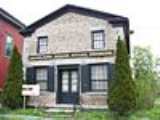
Howland Cobblestone Store
Encyclopedia
The Howland Cobblestone Store, also known as the Howland Stone Store Museum, is a 19th century store significant for its cobblestone architecture. It was added to the National Register of Historic Places
in 1994. At the time of its nomination, the owners were in the process of removing the stucco that had covered the cobblestones since the 1850s. That process has since been completed.
The store was originally owned by Slocum Howland, a Quaker, an abolitionist, a prohibitionist and a suffragist. Among the things sold in his store was the cast iron plow invented locally by his brother-in-law Jethro Wood.
Cobblestone architecture
was developed in New York State to a high degree. A survey identified 660 cobblestone structures in 21 New York counties. There may be approximately 300 elsewhere in the United States, concentrated in Michigan, Ohio, Illinois, and Vermont.
National Register of Historic Places
The National Register of Historic Places is the United States government's official list of districts, sites, buildings, structures, and objects deemed worthy of preservation...
in 1994. At the time of its nomination, the owners were in the process of removing the stucco that had covered the cobblestones since the 1850s. That process has since been completed.
The store was originally owned by Slocum Howland, a Quaker, an abolitionist, a prohibitionist and a suffragist. Among the things sold in his store was the cast iron plow invented locally by his brother-in-law Jethro Wood.
Cobblestone architecture
Cobblestone architecture
Cobblestone architecture refers to the use of cobblestones embedded in mortar as method for erecting walls on houses and commercial buildings.-History:Evidence of the use of cobblestones in building has been found in the ruins of Hierakonpolis...
was developed in New York State to a high degree. A survey identified 660 cobblestone structures in 21 New York counties. There may be approximately 300 elsewhere in the United States, concentrated in Michigan, Ohio, Illinois, and Vermont.
External links
- Howland Stone Store Museum - official site

